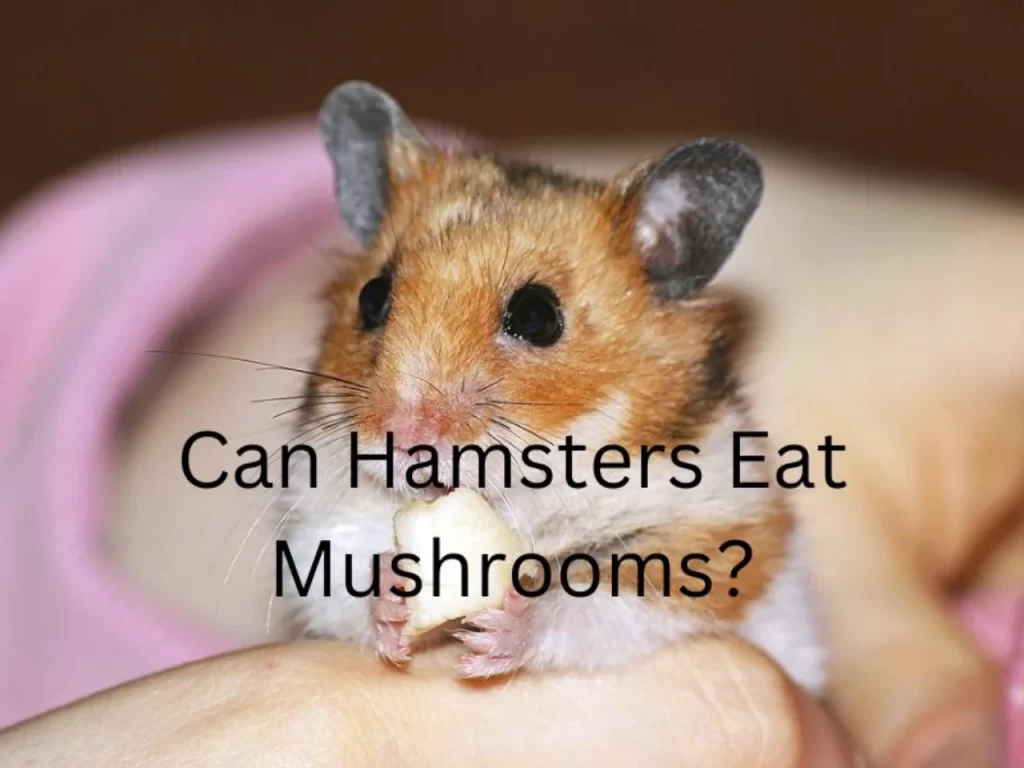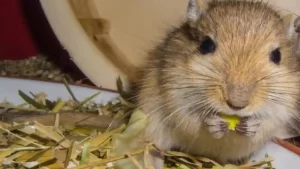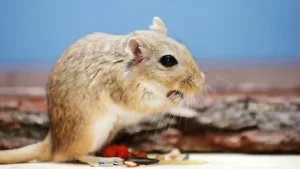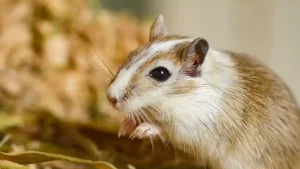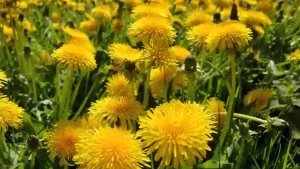The answer to this question is no, generally, hamsters should not eat mushrooms. Mushrooms can be toxic to hamsters and may cause digestive problems or even death if eaten in large enough quantities. Therefore, it is strongly advised against feeding mushrooms to your pet hamster.
If you do decide to give your hamster a mushroom treat, it’s best to opt for a commercially-prepared product specifically designed for small animals like hamsters.
These products are made with safe ingredients that won’t harm your pet and provide healthy nutrition without any of the risks associated with wild mushrooms. Additionally, make sure they’re only given as an occasional treat and not as part of their regular diet.
It’s important to understand the potential dangers that wild mushrooms can pose to your hamster’s health. These include digestive problems, liver or kidney damage, and even death in some cases.
If you do find any mushrooms growing in your yard or around your home, make sure to keep them away from your pet as they could be toxic.
Overall, it is not recommended to feed mushrooms to hamsters due to the potential risks involved. If you want to give your pet a special treat, opt for a commercially-prepared product specifically designed for small animals like hamsters instead.
This way you can ensure that your hamster receives all the nutrition they need without any of the risks associated with wild mushrooms. With this in mind, it’s important to provide your hamster with a healthy, balanced diet to keep them happy and healthy.
Do Hamsters Eat Mushrooms?
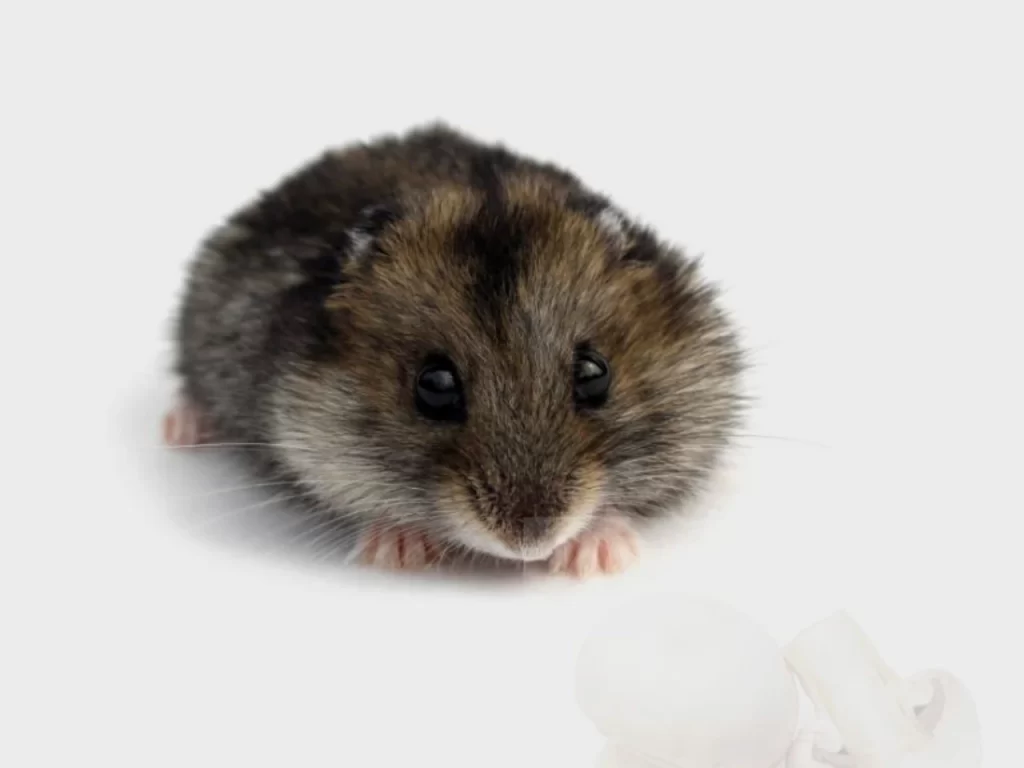
Yes, hamsters can eat mushrooms in moderation. As with any food, they should be given in small amounts and always offered as a treat. Mushrooms are an excellent source of Vitamin B and minerals, but they must not make up all of a hamster’s diet.
In addition to the vitamins and minerals found in mushrooms, they also contain chitin which can make them difficult for a hamster to digest. For this reason, it is important to feed only fresh mushrooms that have been washed thoroughly before feeding them to your hamster.
When feeding your hamster mushrooms, the safest option is usually a white button or baby portobello mushrooms as these varieties are easily digested. Other mushroom types such as shiitake and oyster mushrooms may be offered in small amounts, but should not make up the bulk of your hamster’s diet.
It is important to note that feeding uncooked or partially cooked mushrooms can be dangerous for hamsters as they can contain toxins that can cause serious health problems.
It is therefore best to steam or boil mushrooms before serving them to your pet. As with any treat food, it is also important to ensure that fresh water is available at all times when offering mushrooms as part of a hamster’s diet.
What Mushroom is?
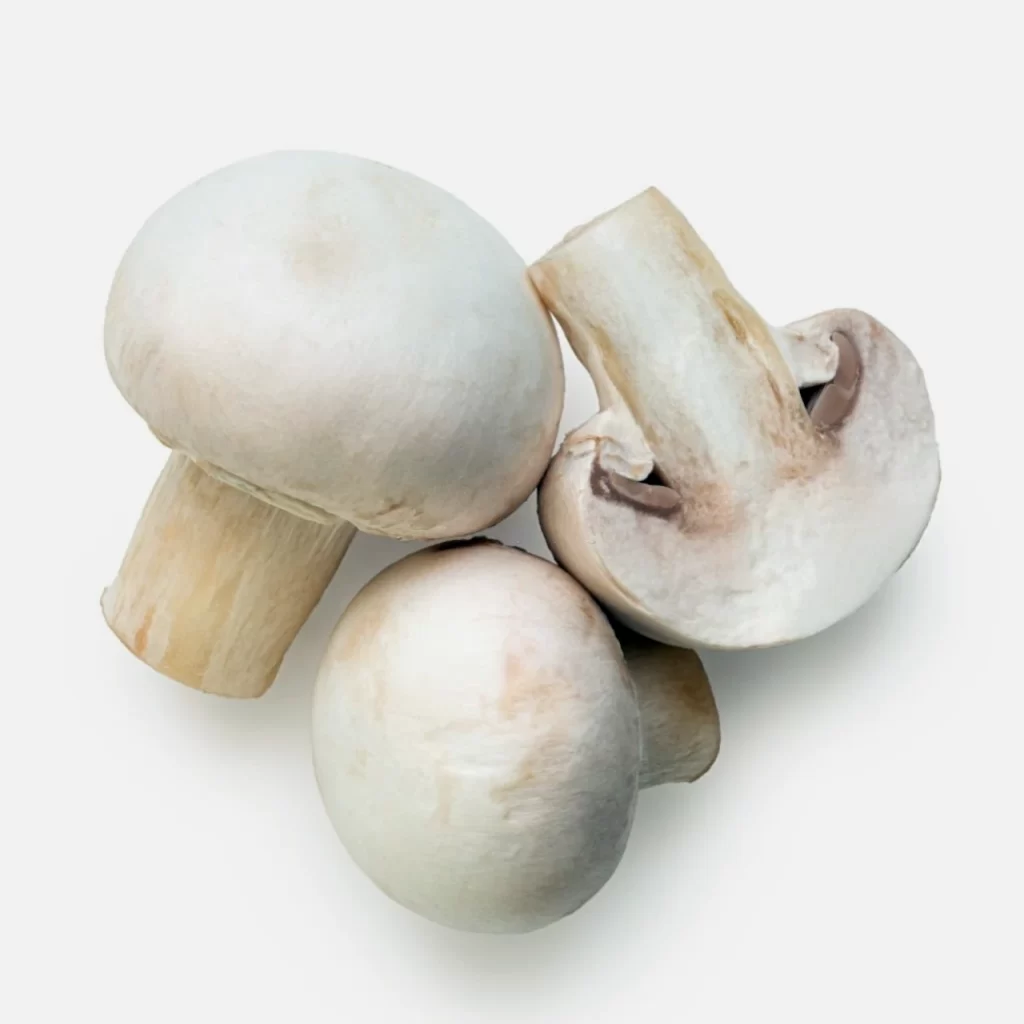
Mushrooms are a type of fungi that grows in the form of a fleshy structure called a fruiting body. They come in many shapes and sizes and range from small and white to large and grey. Although most mushrooms are safe to eat, some poisonous species must be avoided.
Many mushroom species are edible and have been used for centuries as a food source. They can be cooked or eaten raw in salads, soups, sandwiches, and other dishes.
In addition to being a delicious ingredient, mushrooms are also widely used for medicinal purposes. Their natural compounds act as antioxidants that help protect the body from free radical damage and reduce inflammation.
Mushroom extracts can also be used topically to treat skin problems such as acne and rosacea. When it comes to nutrition, mushrooms contain many essential vitamins and minerals including vitamin B12, selenium, potassium, magnesium, zinc, iron, and copper.
They are also a good source of dietary fiber which is important for digestion. Mushrooms provide a variety of health benefits that range from boosting the immune system to fighting cancer.
In general, mushrooms are a safe and healthful food that can be enjoyed in many different ways. However, it is important to make sure you only buy mushrooms from a reputable source, as some wild species may contain toxins or other harmful substances.
Also Read: Can Hamsters Drink Milk?
Is It Safe To Feed Mushrooms To Hamsters?
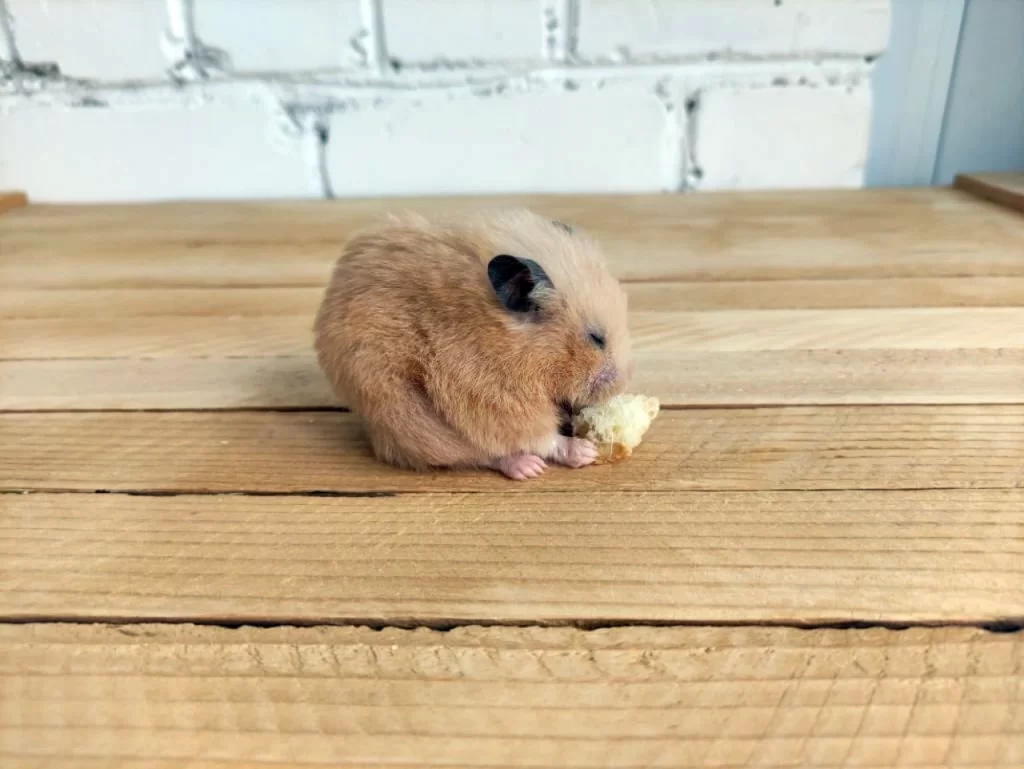
Mushrooms are generally safe to feed to hamsters, as they contain important vitamins and minerals that can be beneficial for the animal. However, it is important to only give your hamster a small number of mushrooms as part of their overall diet.
Mushrooms should not make up more than 10 percent of your hamster’s diet, so feeding them too much could cause digestive problems or other health issues.
Additionally, it is best to stick with white button mushrooms or baby Bella mushrooms for the safest results. Some wild species may contain toxins or other harmful substances, so these should be avoided when feeding your pet.
As always, consult your vet if you have any questions or concerns about incorporating mushrooms into your hamster’s diet.
How Much To Feed Mushrooms To Hamsters?
Mushrooms can be a great addition to a hamster’s diet, but it is important to feed them in moderation.
The recommended amount for mushrooms is about ½ teaspoon per day for an adult-size hamster. Start by introducing small amounts at first and gradually increase the amount over time if your hamster enjoys the taste and texture of mushrooms.
It is also important to make sure that you only feed your hamsters fresh, organic mushrooms that have been washed thoroughly before feeding. Always discard any leftovers as they can quickly spoil or become contaminated with bacteria.
Additionally, never give wild-caught mushrooms to your hamsters as some may contain toxins that can be dangerous or even fatal if consumed by animals.
Finally, always supervise your hamsters when they are eating mushrooms and take away any leftovers that have not been eaten within 10 minutes of being served. This will help ensure your hamster does not overindulge and can safely enjoy its mushroom treat.
What are The Benefits of Feeding mushrooms to hamsters?
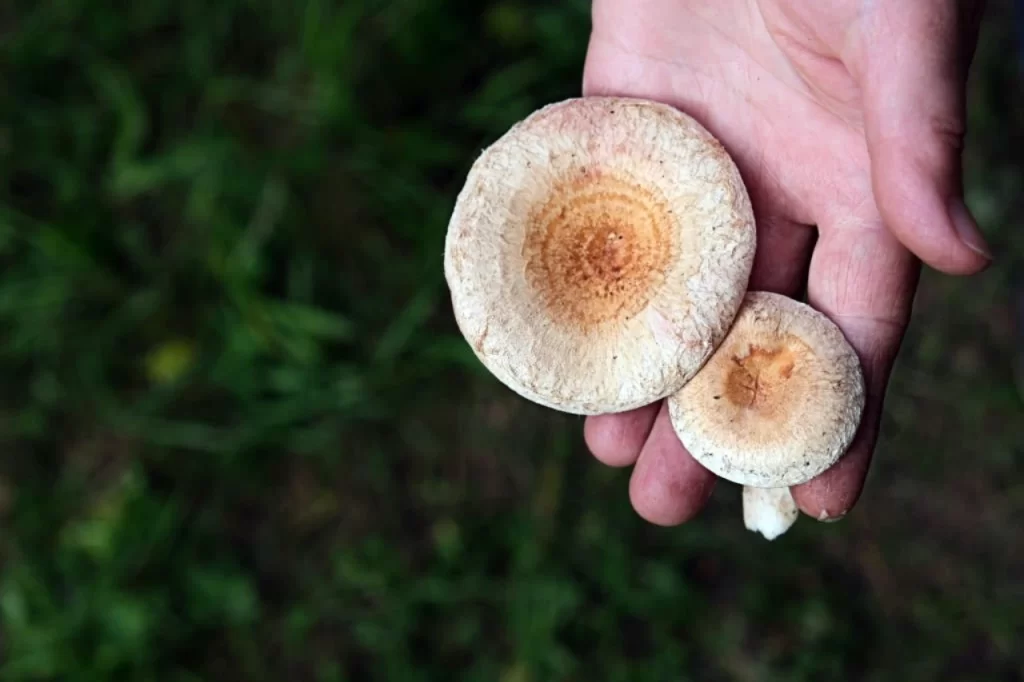
Mushrooms are an excellent source of nutrition for hamsters, as they provide essential vitamins and minerals that benefit the overall health and well-being of your pet.
Mushrooms are a great source of B vitamins, which can help keep the digestive system healthy and ensure your furry friend gets all the nutrients he or she needs.
In addition, mushrooms also contain Vitamin D, which helps to strengthen bones, teeth, and nails in hamsters. They also contain antioxidants that can help combat free radicals in your pet’s body and reduce inflammation.
Feeding mushrooms to hamsters can also provide them with additional dietary fiber, which is necessary for optimal digestion.
Additionally, providing mushrooms can provide variety to your hamster’s diet which will make it more enjoyable and enriching for them. All in all, mushrooms are a great option to include in your pet’s diet and can provide many health benefits.
Some of the precautions to take when feeding mushrooms to hamsters include:
- Only purchase mushrooms from a reputable source.
- Wash the mushrooms thoroughly before giving them to your pet.
- Avoid wild-harvested mushrooms as they can contain toxins that can be harmful to your pet.
- Discarding any bruised or moldy parts of the mushroom before serving;
- Pay attention to how many mushrooms you feed your pet, as too much could cause gastric upset.
Additionally, it’s important not to give cooked mushrooms as these will not provide any nutritional benefit for your hamster. Fresh raw mushrooms are the best option for optimum nutrition.
Finally, always supervise your pet when eating mushrooms and take away any leftovers that have not been eaten within 10 minutes of being served. This will help ensure your hamster does not overindulge and can safely enjoy its mushroom treat.
Also Read: Can Hamsters Eat Mealworms?
What Can Be the Potential Risk Of Feeding Mushrooms To Hamsters?
Mushrooms can be toxic to hamsters, depending on the variety. Some species of mushrooms contain toxins that can cause vomiting, diarrhea, abdominal pain, and liver damage in hamsters.
In some cases, ingestion of certain types of mushrooms can even lead to death. It is important to note that while the vast majority of mushroom varieties are harmless, there is still a risk associated with feeding them to your pet hamster.
Therefore, it is highly recommended that you consult an expert before giving any type of mushroom to your hamster. Even if the variety appears safe, there is always a chance that it could be contaminated with high levels of toxins or other substances that could endanger your pet’s health.
Additionally, store-bought mushrooms may need to be cooked or boiled to make them safe for consumption. If a hamster eats an uncooked mushroom, it could cause serious gastrointestinal problems.
Always take extreme caution when feeding mushrooms to your pet hamster and keep a close eye on them if they do consume any. Seek immediate medical attention if any signs of toxicity or distress occur.
Furthermore, it is best practice to avoid giving wild-picked mushrooms as food for any animal, including hamsters, due to the increased risk of contamination. Stick with store-bought varieties from reliable sources instead.
What Type Of Mushrooms Can A Hamster Eat?
Hamsters can eat certain types of mushrooms, such as whitebuttonsn, cremini, and portobello mushrooms. These must be cooked or lightly steamed before they are given to the hamster.
Avoid giving your pet raw mushrooms, as this may cause an upset stomach. Additionally, it is important to avoid giving wild-caught mushrooms to your hamster as these may contain hazardous toxins that can make your pet ill.
It is also important to only give a very small amount of mushroom to your hamster at one time, as there is a risk of digestive issues if too much is consumed.
To ensure their safety and well-being, always consult with a veterinarian before feeding any type of mushroom to your hamster.
During this consultation, the vet can discuss how to properly prepare and feed mushrooms, as well as provide advice on what types are safe for your pet. Follow these guidelines to keep your hamster healthy and happy.
What Can Be an Alternative To Mushrooms That You Can Feed Your Hamster?
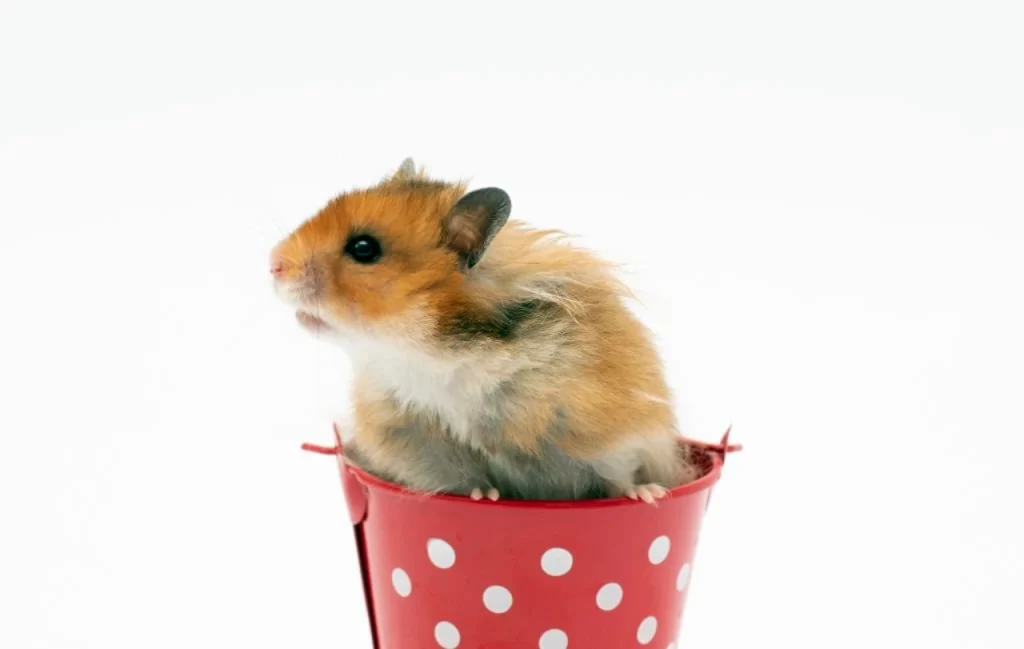
There are plenty of alternatives to mushrooms that you can feed your hamster. These can include fresh vegetables such as lettuce, spinach, carrots, celery, and cucumber; fruits such as apples, pears, and bananas (make sure they’re cut into very small pieces); nuts like peanuts and sunflower seeds; grains like oatmeal and rolled oats (unsweetened); and some commercially produced pellets or treats specifically designed for hamsters.
You should avoid giving your pet processed foods or sugary items. Make sure to always wash produce thoroughly before feeding it to your pet. Additionally, make sure to provide plenty of fresh water to your hamster daily.
For variety in their diet, you can also offer dried fruit and vegetables, hard-boiled eggs (once a week), and cooked meat such as boiled chicken breast. All of these should be given in small portions to ensure that your hamster doesn’t get an upset stomach from overeating. Feeding your pet the correct amount is important for maintaining its health and preventing obesity.
Remember to always check with your vet before introducing new foods into your hamster’s diet. They can provide further advice on what foods are suitable for their needs!
Frequently Asked Questions(FAQs):
Can Syrian Hamsters Eat Mushrooms?
No, Syrian hamsters should not eat mushrooms as they can be toxic and cause health problems for your pet. It is better to provide alternative foods that are safe for them to consume.
Can Dwarf Hamsters Eat Mushrooms?
Dwarf hamsters can safely eat mushrooms, as long as they are cooked or canned. Raw mushrooms may be dangerous for hamsters to consume due to the presence of harmful bacteria and toxins.
Additionally, wild mushrooms should never be fed to hamsters, as these could contain toxic substances that could cause serious illness or even death in small animals.
When feeding mushrooms to a dwarf hamster, it is important to ensure that only edible species are used. If you source your mushrooms, make sure they are not poisonous before you feed them to your pet. Alternatively, canned or cooked store-bought mushrooms are safe options and easier to identify.
Can Roborovski Hamsters Eat Mushrooms?
Roborovski hamsters can eat some mushrooms, but not all. Certain types of non-toxic mushrooms are safe for Roborovskis to consume as an occasional treat.
It is important to identify the type of mushroom before feeding it to your hamster, as some may be toxic or contain high levels of oxalates which can cause health problems.
Some safe options include store-bought white button and portabella mushrooms, as well as wild chanterelles and oyster mushrooms that have been properly identified by a mycologist or other expert.
Feeding small quantities of cooked mushrooms mixed with other vegetables is generally considered a safe choice.
Can Hamsters Eat Raw Mushrooms?
No, hamsters should not eat raw mushrooms. Mushrooms contain compounds that can be toxic for hamsters, so it is best to avoid feeding them raw mushrooms altogether.
If you wish to give your hamster mushrooms as a treat, you should make sure they are cooked thoroughly beforehand.
Additionally, it is recommended to feed only small amounts of cooked mushrooms in moderation as part of an overall balanced diet.
When selecting the type of mushroom to serve your hamster, opt for those labeled “safe” or “edible” such as a white button or cremini mushrooms which have been proven safe for domesticated animals.
As with all treats and snacks, always offer them in moderation, and don’t forget to provide plenty of fresh water and plenty of physical activity opportunities for your pet.
Can Hamsters Eat wild Mushrooms?
No, hamsters should not eat wild mushrooms as some of them may be poisonous. Wild mushrooms can contain toxins that can cause serious health problems and even death if consumed by animals.
Therefore, it is best to avoid feeding your hamster any wild mushrooms you come across in the environment. It is safest to only feed your hamster store-bought mushroom varieties that are safe for pets.
If you’re unsure whether a particular species of mushroom is safe for your pet, consult with a veterinarian or other pet expert before feeding it to your pet.
Additionally, always wash and cook any mushrooms thoroughly before offering them to your hamster. Doing so will reduce the risk of adverse reactions and help ensure their safety.
Can Hamsters Eat Button Mushrooms?
The answer is yes, hamsters can eat button mushrooms in small amounts. But it’s important to remember that these mushrooms have a high water content, so it’s best if they’re given as an occasional treat only.
Button mushrooms should be washed before giving them to your hamster, and they should never be overcooked or served raw.
When introducing any new food into your pet’s diet, moderation is key, and always watch for signs of digestive upset.
If possible, feed your hamster organic button mushrooms whenever you can – this way, you know the mushrooms are free from pesticides and other potential toxins.
As with all new foods, offer small amounts at first to gauge how well your hamster tolerates the mushroom before offering more. If in doubt, it’s always best to check with your veterinarian before introducing a new food into your pet’s diet.
Can Hamsters Eat Shiitake Mushrooms?
Yes, hamsters can eat shiitake mushrooms in small amounts. They should not be given to a hamster as a regular part of their diet but can be given as an occasional snack or treat.
When feeding Shiitake mushrooms to a hamster, it is best to feed them cooked and diced into very small pieces. As with any type of food that is given to your hamster, only give them what they will completely consume in one sitting.
If there are leftovers, discard them after 24 hours. Also, observe your hamster while they are eating the mushrooms to make sure they don’t have any adverse reactions such as vomiting or diarrhea.
Lastly, always consult with your veterinarian before giving any new foods to your hamster, even if it is something as seemingly harmless as shiitake mushrooms.
Final Thoughts:
Yes, hamsters can eat mushrooms in small amounts. However, it is important to note that some types of mushrooms may be toxic to your hamster, so it is important to research the type of mushroom you are feeding them before doing so.
Additionally, due to the high moisture content and low nutrient value of mushrooms, they should only be fed occasionally as a treat.
If you decide to feed your hamster mushrooms, make sure they are properly cleaned and cooked first to avoid any risks associated with consuming raw fungi.
By following these steps and monitoring your pet for any adverse reactions or digestive issues after eating mushrooms, you can feel confident that you’re providing your furry friend with a safe and healthy diet.
Sources:
https://smallpetselect.com/blogs/news/can-hamsters-eat-mushrooms
https://www.thesprucepets.com/feed-your-hamster-safely-1237764
https://animalsake.com/can-hamsters-eat-mushrooms
http://www.petmd.com/exotic/nutrition/evr_ex_hn_feeding_basics?page=show
https://www2.vetmedinformatica2dentalvipwebcaoanimaliadigitaleecommerceblogshoponlinevetcliniclyon.com/hamster-care/are-mushrooms-safe-for-hamsters/
https://www.animalwised.com/can-a-hamster-eat-mushrooms-safely–2632.html
https://www.petful.com/small-pets/what-can-hamsters-eat/

